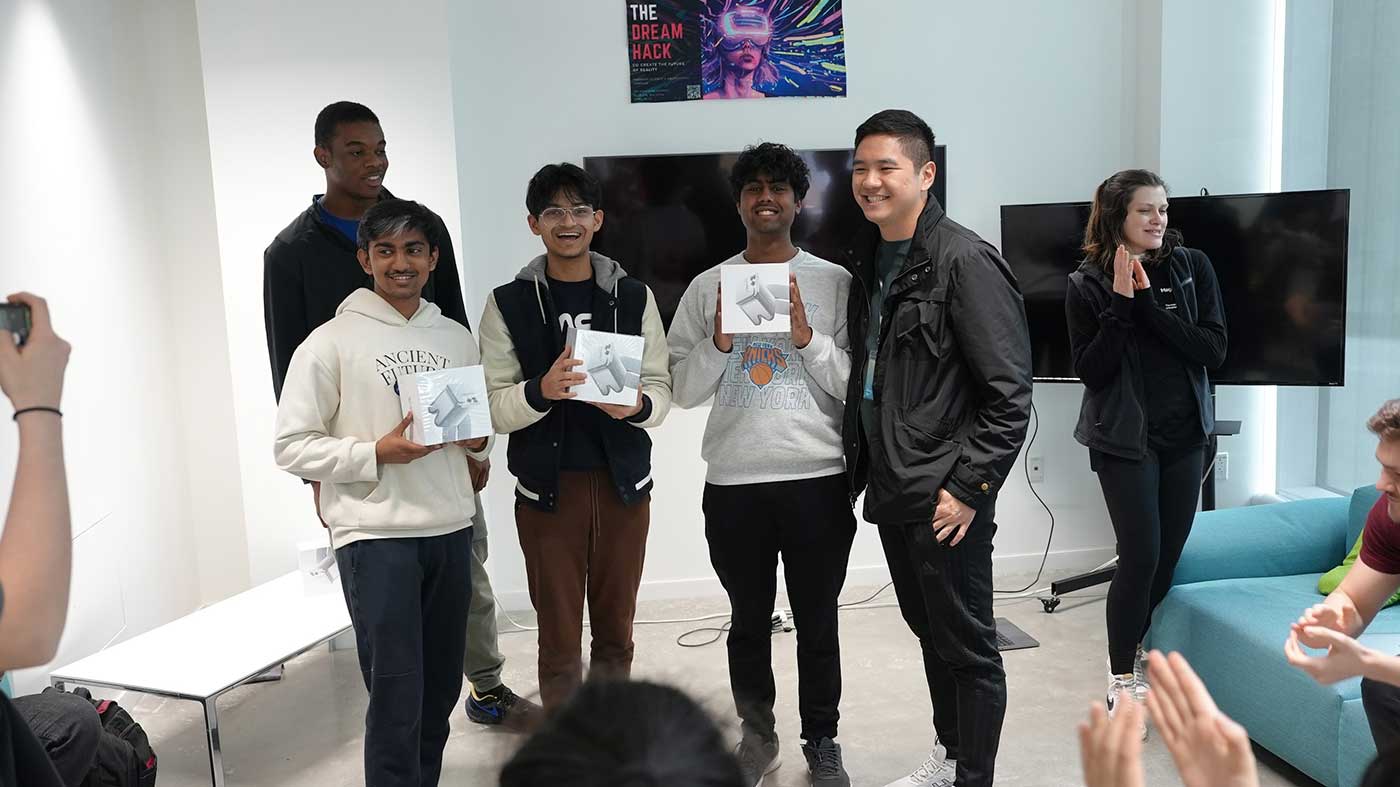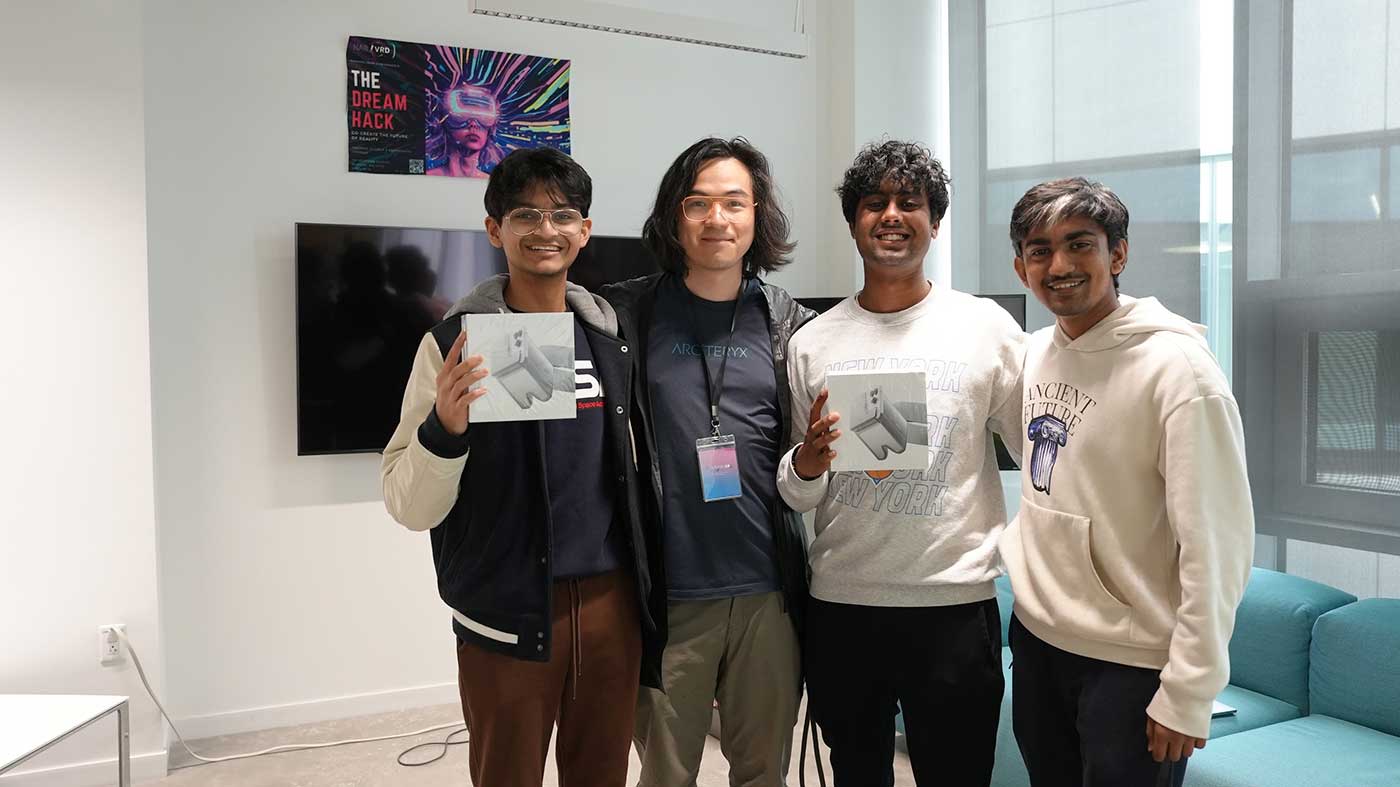MathGPT: first-year students build AI-powered math tutor at Harvard hackathon
Author: Sarah Olender
Date: 09.18.23
Most friendships don’t blossom into a powerful math-teaching tool. But Mihir Walvekar, Harish Sundar, and Sahil Shah’s friendship is unlike many others.
The three met last fall as first-year computer science students, when Shah and Sundar were roommates. They soon met Walvekar, who shared similar interests, and the three became fast friends. Before long, they decided to attend Harvard Dream Hack, an augmented reality and virtual reality hackathon. There, despite having little AR experience, the three knew they’d be challenged to come up with an innovative idea and build a prototype in a short time.
 From left to right: Hackathon competitors Mihir Walvekar, Sahil Shah, and Harish Sundar, plus hackathon judge and Northeastern doctoral student Steven Yoo.
From left to right: Hackathon competitors Mihir Walvekar, Sahil Shah, and Harish Sundar, plus hackathon judge and Northeastern doctoral student Steven Yoo.
The idea the trio decided on was MathGPT, an AI-powered tutoring platform that educates users on math problems and provides feedback so they can identify and fix their mistakes. It was intended to be a teaching experience where students could put on their augmented reality or virtual reality goggles and feel like they were in a learning environment. The trio wanted the user to be able to look at a problem, ask for help, and have the AI explain the steps needed to solve the problem as the user works through it — just as a human tutor would.
We wanted to make something that students like ourselves would want to use,” Shah said. “Instead of just providing answers, our app guides students through the problem-solving process to promote better understanding … We thought that would be a better way for students to learn instead of just getting the answer.”
When building the tool, the team also emphasized that it should be accessible for people from all backgrounds.
“A lot of students can’t afford personal tutors, but this is a free personal tutor you could take anywhere,” Shah said.
When building the website, the three divided the work based on their backgrounds, leveraging their strengths to find success. Walvekar, a computer science major with a psychology background, was interested in coding the AI voice, so he used his psychology knowledge to research and predict how people would respond to certain questions, and how the AI voice should respond as well. Sundar, a computer science major with a math minor, worked with Walvekar to write the program’s Python code. Shah had a strong interest in application programming interfaces (APIs) — which were new to all three members of the MathGPT team — so he took on a strong research role at the beginning, and also helped to develop and design the program.
“The project was mainly research because we didn’t have much experience with API integration,” Sundar said. “We had to find a blueprint on the available technologies and make it work.”
While showcasing their project at Harvard Dream Hack in April was nerve-wracking for the team, they presented MathGPT confidently and impressed a panel of judges that included Northeastern College of Engineering doctoral student Steven Yoo. The team took home fourth place, three pairs of HoloKit AR goggles, and a drive to participate in future hackathons.
 The team poses with HoloKit AR goggles creator Botao Amber Hu (second from left).
The team poses with HoloKit AR goggles creator Botao Amber Hu (second from left).
They also left with plans to continue developing MathGPT into an accessible learning tool for all. Currently, MathGPT is a website where the user enters a math problem and learns the steps to solving it, but ideally, it will fulfill the group’s initial vision.
“Since the hackathon is done and we have time to work on it, we want to get back into what we originally wanted to do: integrating this into a VR environment,” Walvekar said. “We want to get it to a place where you can use VR headsets while you’re doing your homework. It’s a pretty big vision for the future, but it’s definitely doable.”